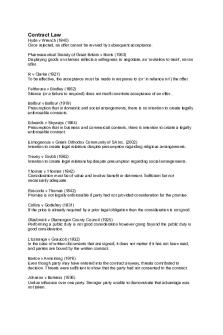Introduction civics and ethics upng.pdf PDF

| Title | Introduction civics and ethics upng.pdf |
|---|---|
| Author | Samson Pangum |
| Pages | 4 |
| File Size | 268.2 KB |
| File Type | |
| Total Downloads | 652 |
| Total Views | 724 |
Summary
What is the foundation on which ethics is built? Ethics is built on the human capacity of freedom of choice. What is ethics in Greek? Ethics in Greek is ethika derived from the roots ethos for character. What is Ethics? Ethics refers to principles or standards of human conduct. What is Civic...
Description
Accelerat ing t he world's research.
Introduction civics and ethics upng.pdf Samson Pangum
Related papers
Download a PDF Pack of t he best relat ed papers
PHILOSOPHY OF EDUCAT ION SIMPLIFIED ABDULMUMINI INDA abdulmumini inda PHILOSOPHY.... Agha kousar Whole Philsophy E learning SUMMARY COPY benard omae
What is the foundation on which ethics is built? Ethics is built on the human capacity of freedom of choice. What is ethics in Greek? Ethics in Greek is ethika derived from the roots ethos for character. What is Ethics? Ethics refers to principles or standards of human conduct. What is Civics? Civics deals with duties and responsibilities of citizens to the state. What is the difference between civics and applied ethics? Civics discusses the same problems that are dealt with by applied ethics, but civics does not go beyond the facts. Whereas applied ethics raises the question of what ought to be the case. How does Taylor define Ethics? Philosophical into the nature and grounds of morality. What is morality? Morality refers to moral judgments or standards and rules of conduct. What are the two judgments that comes under moral judgments? 1. Actual judgment-standards and rules to be found in the moral codes of existing societies. 2. Ideal judgment- standards and rules; those which can be justified on rational grounds. What is moral judgment? Moral judgment is not only about peoples actions but also about their motives or reasons for doing them and about their general character traits.
Sam:16
Page 1
What is the Name of the first University, when was it built, and by whom? The first University ever to be made was called Academy which was established by Plato in 400BCE.It was situated in Europe. What is the name of the 2nd university ever to be made, when was it made and by whom? In 355 BCE Aristotle established the 2 nd university by the name Lyceum. True or False. Plato was the student of Aristotle? Ans. False. Aristotle was a student of Plato whom established the 2 nd university; Lyceum after the death of Plato. What are the three main branches under the umbrella called philosophy taught at both universities? a) Maths, English and Metaphysics b) Geology, Epistemology and Axiology c) History, Epistemology and Metaphysics d) Metaphysics, Epistemology and Axiology Ans.d (Ethics was taught under Axiology) What are the similarities and differences between Ethics and Religion? Similarities- both deal with the question of the “good” in human actions, and the rules that guides one to achieve the goal. Differences- Religion accepts rules, values and beliefs as final . Whereas ethics takes the rulers values and beliefs as starting points for ethical judgments. What are the similarities and differences between Ethics and Politics? Similarities- both deal with government, political structures and functions. Ethical perspective- ethics however deals with good governance , analyses the behavior and conduct of leaders and public servants, and critically evaluates
Sam:16
Page 2
government political structure and functions making sure there is no political or administrative corruption, and prompt delivery of services. What does ethics emphasize in government? Ethics emphasizes transparency, responsibility and accountability in government. What is the similarity between ethics and economics? Both deal with values. What is the difference between ethics and economics? Economics values wealth and profit making, values globalization and free market. Ethics challenges capitalists economies not to attach to much values to products and to those who have purchasing power. Ethics emphasizes humanness in the economic structure, What are the similarities between ethics and history? Both deals with human acts, behavior and conduct. What is the difference between history and ethics? History studies the past and considers the past as determining the present and future. Philosophy takes the problems identified in history and analyses them in an ethical context.
Sam:16
Page 3...
Similar Free PDFs

Introduction to Research Ethics
- 40 Pages

Civics final module
- 240 Pages

Final exam studyguide-Civics
- 3 Pages

\'\'Antz\'\' Civics Assignment
- 3 Pages

Introduction to ethics notes 1 095308
- 197 Pages

S4 Asceticism and ethics
- 4 Pages

Management and Ethics Simulation
- 5 Pages

Law and ethics cases
- 4 Pages
Popular Institutions
- Tinajero National High School - Annex
- Politeknik Caltex Riau
- Yokohama City University
- SGT University
- University of Al-Qadisiyah
- Divine Word College of Vigan
- Techniek College Rotterdam
- Universidade de Santiago
- Universiti Teknologi MARA Cawangan Johor Kampus Pasir Gudang
- Poltekkes Kemenkes Yogyakarta
- Baguio City National High School
- Colegio san marcos
- preparatoria uno
- Centro de Bachillerato Tecnológico Industrial y de Servicios No. 107
- Dalian Maritime University
- Quang Trung Secondary School
- Colegio Tecnológico en Informática
- Corporación Regional de Educación Superior
- Grupo CEDVA
- Dar Al Uloom University
- Centro de Estudios Preuniversitarios de la Universidad Nacional de Ingeniería
- 上智大学
- Aakash International School, Nuna Majara
- San Felipe Neri Catholic School
- Kang Chiao International School - New Taipei City
- Misamis Occidental National High School
- Institución Educativa Escuela Normal Juan Ladrilleros
- Kolehiyo ng Pantukan
- Batanes State College
- Instituto Continental
- Sekolah Menengah Kejuruan Kesehatan Kaltara (Tarakan)
- Colegio de La Inmaculada Concepcion - Cebu







